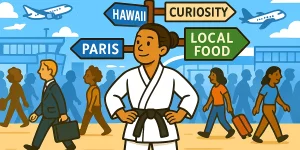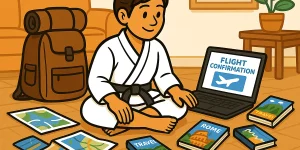Travel Isn’t Always a Dream — And That’s Okay
Everyone loves to talk about the perfect trip — the sunsets, the street food, the stunning photos. But let’s be honest: travel problems are part of the package, especially when you’re exploring internationally. A missed flight, a lost wallet, a sudden illness in a country where you don’t speak the language — things can go wrong.
The good news? Most travel mishaps are fixable. And even better, they don’t have to ruin your journey. In fact, they often become the stories you tell the most.
This article is part of our Trip Kwon Do Travel Academy — your go-to resource for smarter, smoother travel. In our not-so-serious belt system, this guide represents the Yellow Stripe on your white travel belt: the stage where you learn how to stay calm and adapt when things go wrong.
Here, we’re diving into overcoming travel troubles with confidence, problem-solving, and a clear head. Whether you’re facing unexpected travel problems or just want to be ready for whatever comes your way, this guide has your back.
Table of Contents
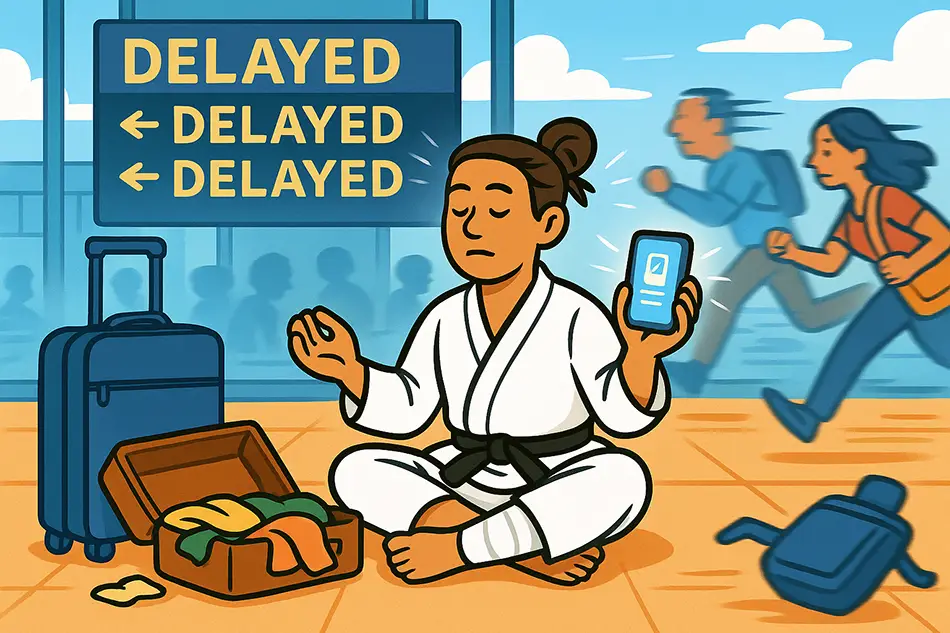
The Golden Rule: Don’t Panic — Look Around and Prioritize
The moment something goes wrong on the road, it’s easy to panic. But that first reaction — your mindset — is often what determines how stressful or manageable the situation becomes.
Here’s your first travel problem-solving tip: pause and assess before taking action. Whether you’ve just realized your passport is missing or your hotel booking vanished into the ether, take a breath. Literally.
Ask yourself:
• Am I safe?
• Do I have access to Wi-Fi or a phone?
• What are my immediate needs — food, shelter, transport?
This short mental checklist helps you shift from reaction to response. Staying calm while traveling isn’t just about mental health — it’s about making smart decisions under pressure. And when you do that, most travel issues turn out to be less dramatic than they first seemed.
Now, let’s take a closer look at the most common travel problems — and what you can actually do to fix them, step by step.
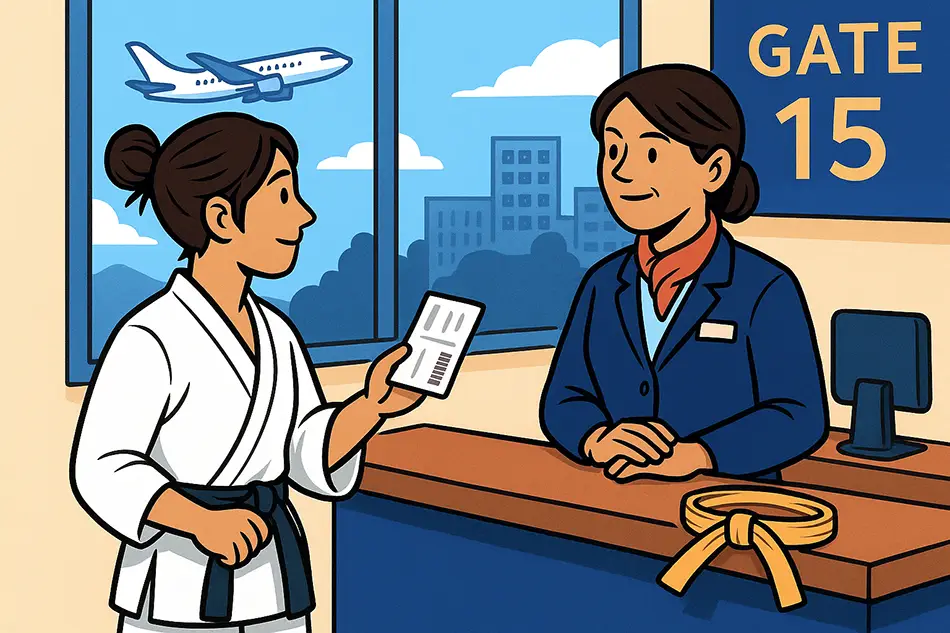
Missed Flights or Connections
So your flight’s delayed — or worse, you’ve just seen your connection taking off without you. It’s frustrating, but not the end of the world.
What to do if you miss a flight abroad:
- Stay near the gate and talk to the airline desk staff right away — they often have more flexibility than app or hotline agents.
- Use the airline’s mobile app to rebook faster or join virtual standby queues.
- Ask about partner airlines — many major carriers can rebook you on an affiliated flight at no extra cost.
- Call your travel insurance provider if rebooking costs stack up — this is when having solid coverage can really save you stress and money
Insider Tip
When booking connecting flights, leave at least 2–3 hours between international connections and 1.5–2 hoursfor domestic ones. If you’re changing airlines, passing through immigration, or switching terminals, add an extra hour. Even seasoned travelers can get caught by flight delays, long lines, or last-minute gate changes — a little buffer goes a long way.

Lost or Delayed Luggage
It’s more common than you’d think — your flight lands, everyone’s pulling bags off the carousel… except you. Your suitcase didn’t make the journey. It’s frustrating, sure, but it’s not a disaster — and it’s often temporary. Most lost luggage is found and delivered within a day or two.
Here’s how to handle lost luggage on international flights:
- Report it immediately at the airline counter before leaving the airport. Get a written report and a reference number.
- Ask for an essentials kit or spending allowance — many airlines offer basic toiletries and compensation for emergency purchases.
- Track your bag with luggage apps or airline tools. Some even let you see your bag’s location in real time.
- Keep your essentials in your carry-on. If you’re wondering what to pack in case of travel emergencies, think basics: a spare outfit, medications, phone charger, a copy of your ID, and your toothbrush.
Luggage troubles are one of the most common travel problems, but they’re usually fixable — and entirely manageable with the right mindset. A little preparation and a solid travel packing strategy can turn what feels like a crisis into a minor hiccup.
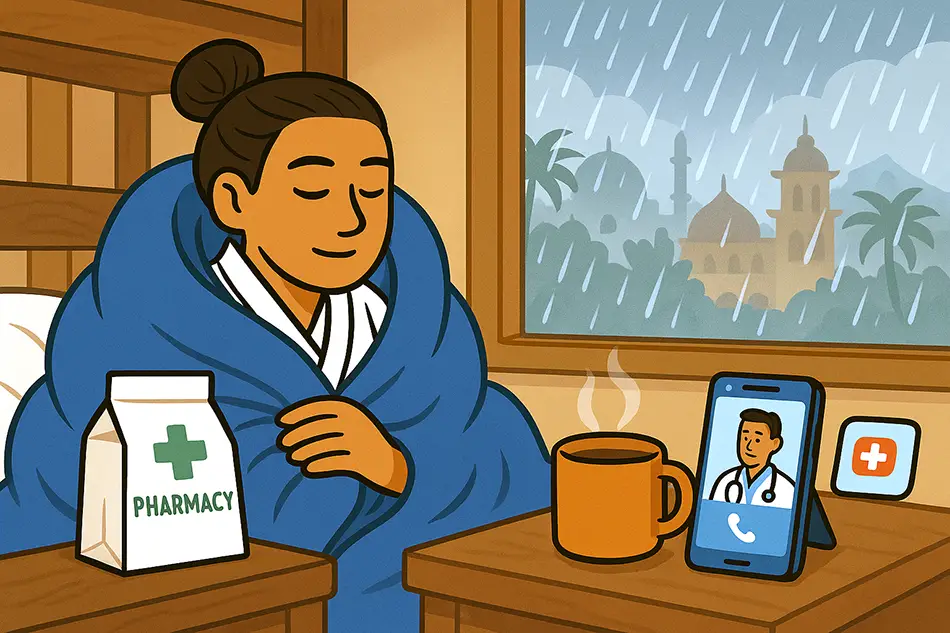
Getting Sick Abroad
It’s one of the top fears for many travelers — and yes, it’s uncomfortable. But getting sick while abroad doesn’t have to spiral into panic.
How to stay safe if you’re sick in a foreign country:
- Don’t push through. Rest, hydrate, and listen to your body. A day off the itinerary is better than a week in bed.
- Visit a local pharmacy first. In many countries, pharmacists offer over-the-counter advice for common issues like stomach bugs or cold symptoms — and often speak basic English.
- Use telemedicine apps if you need a doctor but don’t want to leave your hotel.
- Contact your travel insurance provider for hospital referrals and emergency assistance.
- Know where to go. Most cities have clinics familiar with treating tourists. Ask your hotel or hostel for a trusted recommendation.
If you’re prone to certain conditions or on medication, packing a mini travel first aid kit can make all the difference. Include basics like ibuprofen, electrolyte powder, antihistamines, and any prescriptions — in their original packaging.

Overcoming Language Barriers
Worried about not speaking the local language? You’re not alone — for many first-time travelers, language barriers are one of the biggest fears. Some people even delay trips because they’re unsure how they’ll communicate. But here’s the good news: you don’t need to be fluent to travel well — or to enjoy it.
In fact, navigating a language you don’t know can lead to some of the most memorable, funny, and rewarding moments of your trip. Whether you’re ordering food with gestures or figuring things out with a friendly local, it often becomes part of what makes the experience unique.
And today, technology makes communication easier than ever, turning what used to be a major obstacle into a manageable — sometimes even fun — part of the journey.
Still, when things go sideways — like trying to find a doctor or explain lost baggage — clear communication matters. Here’s how to handle language barriers when traveling:
- Download offline translation apps like Google Translate (App Store / Google Play) or iTranslate ( App store / Google Play).
- Use the photo translate feature to read signs, menus, or medication labels.
- Use visual aids. Pointing, photos, or written addresses go a long way when words fail.
- Write down important info. Hotel address, emergency contacts, allergies — keep them handy in the local language or as screenshots.
- Ask for help in the right places. Hotel receptionists, tourism offices, and even airport staff are usually trained to help foreigners.
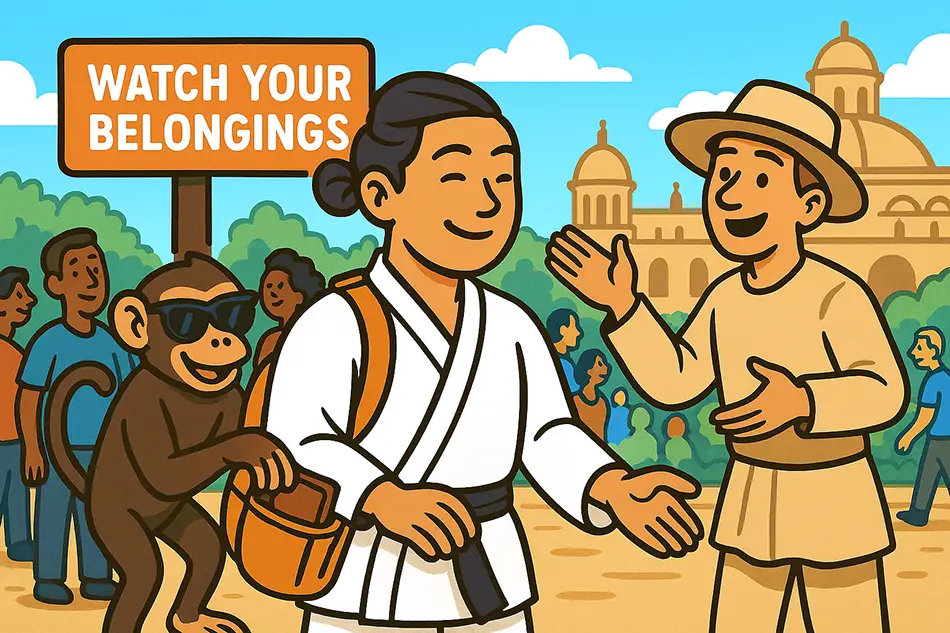
Scams, Theft, and Lost Wallets
No one wants to deal with theft or scams on a trip — and with the right trip preparation, you often won’t have to. This is one of those areas where being proactive makes a huge difference. That’s why we put extra focus on it in our Trip Preparation Guide — from securing your documents to choosing the right wallet setup, a bit of planning goes a long way.
Still, even well-prepared travelers can get caught off guard. One moment you’re checking directions, the next your bag feels lighter or your card gets declined. These situations can be unsettling — but they don’t have to derail your journey.
Our Travel Safety Guide covers proactive ways to stay secure on the road, but if you’re already in the thick of it, here’s what to know, what to avoid, and how to bounce back fast.
How to avoid scams while traveling internationally:
- Stay aware in tourist-heavy areas. Pickpockets love busy markets, stations, and famous landmarks.
- Avoid distractions. Scammers often use tactics like spilling something on you or asking for help — keep walking.
- Use RFID-blocking wallets and carry only one backup card and a copy of your ID when out and about.
- Don’t flash cash or valuables. A minimalist, low-profile approach helps you blend in.
If you’re dealing with a lost wallet abroad:
- Report the theft to local police — A police report isn’t just a formality — most travel insurance providers require it for stolen item claims.
- Freeze your cards immediately using your mobile banking app or by calling your bank’s international support line.
- Access your emergency funds. Ideally, you’ve packed a backup card or cash in a separate bag — or can use digital wallets like Apple Pay, Wise, or Revolut if they’re still accessible.
- Contact your embassy if your passport was stolen or if you need help finding safe, temporary accommodations. They can guide you through the replacement process and provide support.
You might feel shaken, but many travelers go through this — it’s just another challenge to navigate. With smart prep and a level head, you’ll recover quickly.

Lost or Stolen Phone Abroad
Let’s not sugarcoat it — losing your phone while traveling can seriously mess with your plans. It holds your bookings, maps, money, and your connection to home. If you’re not prepared, it can feel like everything’s gone off track.
That’s exactly why we’ve put together a full Travel Phone Prep Guide — covering everything from how to protect your phone before the trip to exactly what to do if it gets stolen. It’s worth checking out if you want to be ready for anything.
But if it’s already happened, here’s a quick list to help you recover:
- Borrow a device or use a hotel computer to get online.
- Log in to your Apple ID or Google Account (use private/incognito mode if you’re on a shared or hotel computer) and try to locate, lock, or erase your phone remotely.
- Change key passwords if possible (email, banking, cloud storage).
- Freeze banking or payment apps.
- Report the theft to local police — this is also necessary for insurance claims.
- Buy a cheap replacement phone with a local SIM card to regain access.
- Contact your mobile provider to suspend your number
Losing your phone is tough, but it doesn’t have to derail your trip. With a few quick steps, you can stay in control — and next time, you’ll be even better prepared.
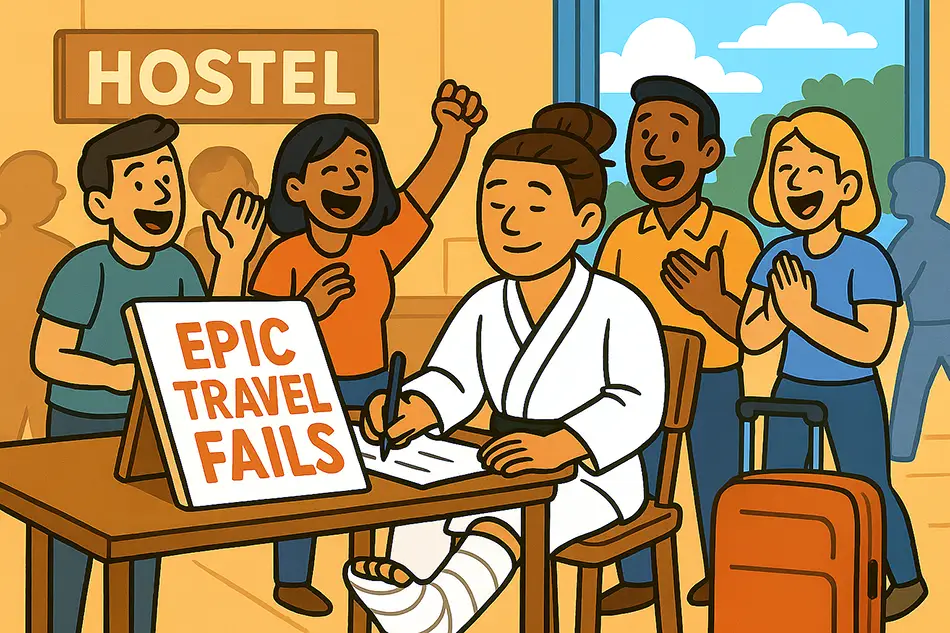
When Things Go Wrong, Stories Begin
No matter how carefully you plan, nothing ever goes 100% to plan. Flights get canceled, bags go missing, phones vanish, and yes — sometimes you get sick in the middle of nowhere with zero Wi-Fi. But none of that means your trip is ruined.
These moments — the messy, unexpected ones — have been faced (and solved) by millions of travelers before you. And more often than not, they become the parts of the trip you talk about for years. They’re proof that you’re not just visiting places — you’re learning how to handle life on the move.
So if something goes sideways, don’t let fear or frustration stop you. Start your recovery with one simple phrase: “Seems like that’s going to be an amazing story once it’s over.”
Congrats — you’ve just earned your Yellow Stripe on the White Belt in Trip Kwon Do. You now know how to handle travel mishaps with calm, clarity, and resilience.
→ Next step: Learn how to find cheap flights like a pro — and earn your Yellow Belt
→ Looking for more skills? Head to the full Trip Kwon Do Travel Academy to level up




